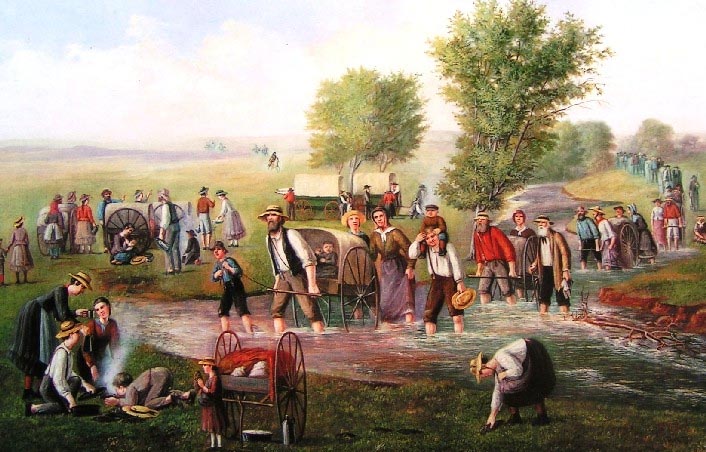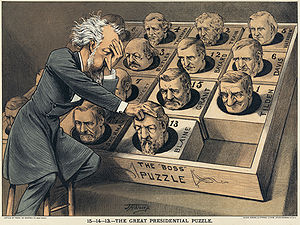Category: Cornucopia
-

MR: “Meanings of Mormon Devotion: Robert Orsi and the Possibilities of Studying Mormon Lived Religion”
A new issue of The Mormon Review is available, with Christopher C. Jones’s review of The Madonna of 115th Street by Robert Orsi. The article is available at: Christopher C. Jones, “Meanings of Mormon Devotion: Robert Orsi and the Possibilities of Studying Mormon Lived Religion ,” The Mormon Review, vol.2 no. 2 [HTML] [PDF] For…
-
The Angel and the Internet
A few years ago, the confluence of the Mitt Romney campaign and Proposition 8 (and to some extent Harry Reid) focused sustained national attention on the church and its members. The church’s profile has only continued to grow since then, raising a variety of questions about assimilation, retrenchment, and the future of the flock. Mormonism…
-
Jonah, overboard.
If you haven’t heard the story in Sunday School yet, you will shortly (Jonah 1). Surprisingly, the combination of God and bad weather is still a potent force in the modern era — my stake was praying for rain earlier this year. But here is a more colorful Jonah-like account with sailors, storms, and witches…
-
The Icarians
While browsing the Wikipedia entry on Nauvoo, I saw this: Nauvoo attracts large numbers of visitors for its historic importance and its religious significance to members of…groups such as the Icarians. I’d never heard of the Icarians before. So, continuing down the Wikipedia path, I found this: The Icarians were a French utopian movement, founded…
-
Those Oh-So-Temporary Golden Ages
I started teaching seminary three weeks ago. We’re off to a great start. I don’t have any goofballs in my class, so that helps. As I started preparing before the semester began, I tried to figure out how to present the Doctrine and Covenants in a way that could be compelling to high school students.…
-
Conference Announcement: “Embracing the Law: A Scholarly Conference on Doctrine & Covenants 42”
Embracing the Law A scholarly conference on Doctrine and Covenants 42 September 10, 2010 • Free Admission Session 1 9:00 – 10:45 a.m., Stonemetz Conference Room Jeremiah John, Southern Virginia University Law and Church in Section 42 of the Doctrine and Covenants Nate Oman, William and Mary Law School “I Give Unto You My Law”:…
-
The Limits of Orthodoxy
Apparently, you can’t say polygamy was not God’s will. But you can say that a male-only priesthood is not God’s will. Go figure.
-
“War and Peace in Our Time: Mormon Perspectives” Proposal Deadline Sept. 1
I recently received an email asking “if the LDS Church has an official (or unofficial) Social Doctrine, similarly to other churches”. In this and many areas, the Church has little in the way of an official position, and this wisely allows for a rich and diverse discussion among Mormons about how the Gospel should shape…
-
Farewell and Thanks from a Bad Blogger
As I mentioned in my first post, I was reluctant to be a guest blogger, mainly because I doubted I’d have anything to add to the conversation. I also didn’t realize then that this blog is as active as it is– the other blog I sometimes contribute to almost never elicits more than a couple…
-

Instruction as Worship
It’s no secret that we Mormons aren’t big on praise worship in our meetings. You won’t hear any “hallelujahs” or “amens” in our sacrament meetings. And that’s fine for us. I think that members of our church tend to believe that worship is best accomplished through living in accordance to God’s commandments — that obedience…
-
Faith and Reason as Moral Ideals
The sense of many today that faith is antithetical to reason grows partly out of the Reformation and Enlightenment, in which people on both sides found they could not intellectually reconcile the conclusions of faith and reason. Just as importantly, faith and reason each came to represent a different moral ideal. As I see them,…
-

Sunday School Lesson 31: Proverbs and Ecclesiastes
I laughed when I saw what this lesson covers, “only” slightly less than 16,000 words in Proverbs and slightly more than 23,000 words in Ecclesiastes. If we have the full 40 minutes, that means we should try to cover the content of about 1,000 words per minute (assuming that we don’t have opening or closing…
-
Mormonism within Christianity; Christianity within Mormonism
Every so often the question “Are Mormons Christians?” gets batted around; the question has probably grown tedious for many. The discussions I’ve heard or read, though, usually leave me dissatisfied, in part because they treat Mormonism as if it were some unitary thing of definite and agreed upon content, and then argue about whether that…
-
Antichrist to an Antichrist
I’m currently through the beginning of Nietzsche’s The Will to Power. I like what I’ve read, and I’ve identified a few possible Nietzschean approaches to Mormonism. Joseph and Neitzsche as two men whose respective philosophies are fundamentally similar. Latter-Day-Saintism as Nietzsche’s “Revaluation of All Values”. Joseph as a realization of Neitzsche’s ubermensch. Now I’m no…
-
How to Integrate Faith and Scholarship– and How Not To
My title here makes a false promise, obviously, on which I can’t deliver. But comments on my earlier post suggest I ought to try to say something on the subject (which may be of interest, I admit, mostly to religiously-oriented academics). And it’s a subject about which I’ve wondered from time to time. In fact,…
-

Brother, can you spare a symposium?
Mormon Studies could be headed for a rough patch, because the career paths that make professional study of Mormon topics at least occasionally possible are disappearing.
-
Confession of a Primary Pianist
When my friend Craig Harline suggested a few months ago that I do some guest blogging on Times and Seasons, I was initially enthusiastic; but on second thought my enthusiasm waned. It became clear to me that I probably wouldn’t have much to contribute to this conversation. And the main reason I wouldn’t have much…
-
Times and Seasons Welcomes Steve Smith
Times and Seasons is happy to welcome as a guest blogger Steve Smith, who teaches and writes mainly about religious freedom, constitutional law, and jurisprudence. His most recent book is The Disenchantment of Secular Discourse (Harvard University Press, 2010). Steve graduated from BYU in 1976 before studying law at Yale, and he has taught at…
-
Just because they can’t see you doesn’t mean you’re not there
The call for papers for the Third Biannual Faith and Knowledge Conference for LDS Graduate Students in Religion contains a sentence that is, I think, wrong in three different ways.
-

The Dictation of the Holy Ghost to Us: A Pioneer Day Sermon
I spoke in church today. The youth in our stake just completed a four-day handcart pioneer re-enactment, and my remarks followed upon several youth speakers testimonies about their experience. Below is the text of my sermon:
-
Your opportunity to WIN. FABULOUS. PRIZES.
You’ve always dreamed of starting a handsome Mormon studies collection — who hasn’t? This week, you have an unprecedented opportunity to start your collection in style. As we’ve mentioned here and elsewhere, Sunstone 2010 is just around the corner. It will take place from August 4th through August 8th in Salt Lake City. Online pre-registration…
-
Leadership and Self-Flagellation: Sharing Your Sins with the World
Nate’s thoughtful post inspired a great discussion. Andrew spoke up to say: …even though Church leaders could and should stress their own imperfection before Church members, they don’t…but instead they play into this paragon of virtue imagery that people put on them. Wm Morris responded with: I have no desire to see more self-flagellation on…
-
I Cannot Read a Sealed Book – Part I: The Basic Case for Making Public the Handbook
The church handbook is a foundational document for the lived experience of LDS church members. The handbook (actually two specific handbooks at present, but for convenience’s sake we’ll just refer to it as the handbook) sets out rules regarding a variety of important experiences in church member life. The Encyclopedia of Mormonism notes that the…
-
Mormon Studies on Your eReader
I got a Kindle a few weeks ago, and my affection for it is quickly approaching idolatry. But we aren’t going to talk about that right now; we’re going to talk about how to Mormon-Studies-geek out your ereader. Here’s what I have found so far; I expect you to add to the fun.
-
Reforming the Church – A Response to Nate
Nate has written a very articulate and worthwhile post that I think cuts to the heart of a common problem in how we emotionally respond to issues we have with the church. It goes together well with this other post of his which is similarly worth (re-)reading. I’m responding not because I particularly disagree with…
-
Reforming the Church, Angst, and the Spirituality of Democratic Liberalism
t seems to me that what is at issue here is less one’s conduct than one’s emotional and intellectual stance. In other words, I suspect that there is relatively little in terms of conduct that would differ between folks here. We’re all interested in remaining faithful, contributing, serving, etc. I suspect that none of us…
-

The “V” Words
This post is brought to you by the letter “V”. (Don’t worry, that’s grape juice in the picture. Really. I’m sure it is.) Vigor. Verdant. Vibrant. Vivacious. AliVe. These are the qualities I expect true religion to inculcate. Does it make me think more? Does it make me love more? Does it make me see…
-
BYU Man Whose Grades Your Grades Could Be Like
This promotional video from BYU’s Harold Lee Library is so well done it deserves it’s own post at Times & Seasons. That’s how good it is.
-

Labels
Alright people, here we go…on labels! (apollo, this one’s for you.) Labels of preference These are the labels anyone can just pick for themselves. “Awesome”, “feminist”, and “Abba fan” are all labels of preference. You just pick one, apply it to yourself, and no one can say you’re wrong! These labels aren’t owned by any…
-

Scriptural Literacy
I’ve just been called as a seminary teacher. Today I was sustained during sacrament meeting. I’m really excited about it — I enjoy working with youth, I enjoy the scriptures, and I enjoy teaching. Heck, I’m even a morning person. The course of study is the Doctrine & Covenants. It has me thinking about how…
